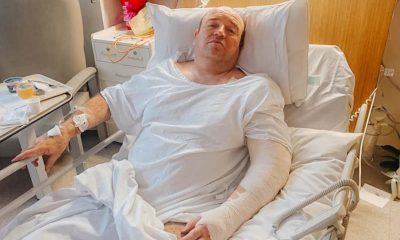#Life
The Bigger Picture: Understanding Loss, Sacrifice, and Purpose in Dhul Hijjah
Published

Time and time again, sitting with hundreds of patients in my role as a hospital chaplain, I’m learning that the most powerful spiritual discoveries come at different times and in different ways for every one of us. And yet, many of the lessons learned through crisis and hardship mirror the deeper wisdoms already embedded within the sacred rituals of Hajj – which in turn relates to finding purpose in Dhul Hijjah.
After particularly meaningful patient encounters, I try to spend some time reflecting on the themes of the patient’s crisis, and connecting those themes to ones that surface in our tradition. In Clinical Pastoral Education (CPE), or field-work training for chaplaincy students, this practice is called theological reflection.
One middle-aged patient I visited had traveled to a major metropolis for cosmetic surgery. It was the first time they had ever left their family, who had encouraged the patient to go and “do something for yourself.” Unexpectedly, the procedure resulted in a worsening infection that necessitated a lengthy hospitalization. What was supposed to be a two or three week trip for the procedure stretched out for over a month with no promises of a flight home anytime soon.
Keep supporting MuslimMatters for the sake of Allah
Alhamdulillah, we're at over 850 supporters. Help us get to 900 supporters this month. All it takes is a small gift from a reader like you to keep us going, for just $2 / month.
The Prophet (SAW) has taught us the best of deeds are those that done consistently, even if they are small. Click here to support MuslimMatters with a monthly donation of $2 per month. Set it and collect blessings from Allah (swt) for the khayr you're supporting without thinking about it.
With me, the patient cried, grieving many losses: mobility, autonomy, family and community roles, home, sleep and rest, and a body free from constant pain. The patient missed their children viscerally, grateful for FaceTime but tortured by the look in the children’s eyes when the children admitted how much they miss the patient.
What I thought throughout the visit:
Why did you sacrifice so much for cosmetic surgery? Did you really need this? What are you teaching your children? Don’t you see God calling you back to Him through this?
What I said:
Nothing.
Meaning-Making and The Role of the Chaplain
In times of crisis, meaning-making surfaces in various ways. Some of us revive and internalize what we already know theoretically from our religious tradition, and others of us have to create meaning anew. In the end, it’s always God’s timing and God’s way on the path. The Prophet Muhammad ﷺ knew this, serving as a gentle guide who could be patient with people’s individualized journeys to Allah 

“O Prophet, indeed We have sent you as a witness and a bringer of good tidings and a warner.” [Surat Al-‘Aĥzāb 33;45]
Notably, Allah 
To counter my assumptions and judgments of the patient, I listened longer to understand how the patient had reached the decision to pursue cosmetic surgery. The patient’s larger story was still unfolding, and I was there for a brief moment as an unnamed, side character (“the hospital chaplain”) in this single chapter. The patient spoke about their relatively smooth and privileged life and their gradual interest in cosmetic surgery as they approached their fifties. Most of the patient’s social circle had already done work on their bodies with easy results.
The patient eventually said, “I know God is trying to teach me a lesson in gratitude and humility. I’m still unsure why all of this had to happen in such an extreme way, but I know there’s a lesson here.” Slowly, the patient began the delicate and powerful process of meaning-making. The patient symbolically ran between two mountains in the retelling of their story, seeking answers and assistance. Lady Hajar 



“God will find a way out for those who are mindful of Him, and will provide for them from an unexpected source; God will be enough for those who put their trust in Him” [Surat Aţ-Ţalāq: 65;3]
Hajar 



Suffering as a Potential Source of Growth
Notably, until both the patient and Hajar 
I could have perhaps delivered a pithy lecture at bedside with all of these points. I could have peppered the patient’s story with the loud judgments running through my mind to make them “see” their shortcomings as I perceived them. However, the most impactful means of learning often come not from text but from lived experience. Is it no wonder, then, that Hajj engages all pilgrims on a holistic level in mind, body, and soul/spirit. Many pilgrims return from Hajj recounting the grueling conditions and not necessarily a soothing spiritual encounter. The here and now of the work – grounded in the cyclical movements of salah, grounded in the hunger pangs of our stomachs while fasting, grounded in the ambulation of tawaf – offer conduits to Allah 
In the Absence of Clear Answers
The patient also shared that they had been praying more frequently since the botched surgery but still “heard” no answer from God. “I know God is listening,” the patient said thoughtfully, “but He hasn’t told me why this is happening.” How many of us have raised our eyes heavenward and asked, “Why is this happening?” only to be met with seeming silence? Lady Hajar 






In the absence of a clear answer, Hajar 







Purposeful Sacrifice
Hajar 




Sacrifice necessarily entails loss. To sacrifice means that we willingly waive something for another. In Islam, God asks Muslims to sacrifice for His Sake only. Psychologically, this cushions our loss by giving it a higher purpose – we lose something, but we gain something better, whether it be the pleasure of God, inner peace through detachment, reward in the Hereafter, or all of the above. That which we love and treasure most, we sacrifice for. As Muslims, our striving to Allah 

For the patient, sacrifice came in the form of leaving family and home for a journey toward cosmetic surgery. When the loss heavily outweighed the gain, bewilderment and grief crashed upon the patient. What was lost never met the threshold of purpose. Pilgrims leave behind their families and familiar comforts for Hajj with a focused goal of striving to Allah 
As I reflect on the legacy of Prophet Ibrahim 









“Indeed, Abraham was a [comprehensive] leader, devoutly obedient to Allah , inclining toward truth, and he was not of those who associate others with Allah.”
“[He was] grateful for His favors. Allah chose him and guided him to a straight path.”
“And We gave him good in this world, and indeed, in the Hereafter he will be among the righteous.”
“Then We revealed to you, [O Muhammad], to follow the religion of Abraham, inclining toward truth; and he was not of those who associate with Allah.” [Surat An-Naĥl; 16:120-123]
I never truly understood the significance of this title as one that reflects Ibrahim’s incredibly high station. Ibrahim 

For me as a chaplain, I often find Allah’s 

We need not transcend or travel to know and connect to Allah 
In the Qur’an, God describes Himself as “Nurun ‘ala nur,” or Light upon Light. When I reflect on this beautiful way of capturing God’s essence, I’m struck by how the brilliance of light, when shined into a crevice, reaches all surfaces from the shallow to the deepest and darkest of voids. For those seeking God, remember that He is not only a Constant Presence as you move about your day –“He is with you wherever you are” [Surat Al-Ĥadīd:57;4) – His light bathes and caresses the deepest parts of you, physically and metaphysically. Don’t turn outward to find Him; seek Him in your being and in the deep, dark places of your soul. He is here.
May the Most Merciful accept from us our striving and seeking in these blessed days and beyond; may He grant us the awareness of seeing the sacred in the mundane; and may He grant us the strength and fortitude we need to sacrifice that which distances us from Him. May our sacrifices result in elevation in station and in nearness to God. Ameen.
Related reading:
– Yaser Birjas | In the Footsteps of the Prophet Ibrahim
Yaser Birjas | In the Footsteps of the Prophet Ibrahim عليه السلام
– A Mother’s Ibaadah: Lessons From The Story Of Hajar
Keep supporting MuslimMatters for the sake of Allah
Alhamdulillah, we're at over 850 supporters. Help us get to 900 supporters this month. All it takes is a small gift from a reader like you to keep us going, for just $2 / month.
The Prophet (SAW) has taught us the best of deeds are those that done consistently, even if they are small. Click here to support MuslimMatters with a monthly donation of $2 per month. Set it and collect blessings from Allah (swt) for the khayr you're supporting without thinking about it.
Chaplain Sondos Kholaki serves as a hospital staff chaplain and volunteer police and community chaplain in Southern California. She is board-certified with the Association of Professional Chaplains (APC). Sondos earned a Master of Divinity degree in Islamic Chaplaincy at the Claremont School of Theology/Bayan Islamic Graduate School as the recipient of the Fathi Osman Academic Excellence award and a Bachelor's degree in English and Creative Writing from UCLA, where she received the prestigious Regents Scholar award. Sondos is the author of the award-winning book, "Musings of a Muslim Chaplain" (2020) and a co-editor of the anthology, "Mantle of Mercy: Islamic Chaplaincy in North America" (2022). Sondos also served as Vice President of Healthcare for the Association of Muslim Chaplains.


[Podcast] Should Muslims Ally with Conservatives or Progressives? | Imam Dawud Walid

Iron Principle Under Pressure: A Profile Of Naledi Pandor

Far Away [Part 5] – There Is Only Work

Keeping The Faith After Loss: How To Save A Grieving Heart

Op-Ed: From Pakistan To Gaza – Why Senator Mushtaq Ahmad Khan Terrifies Power And Zionism

Restoring Balance In An Individualized Society: The Islamic Perspective on Parent-Child Relationships

Faith and Algorithms: From an Ethical Framework for Islamic AI to Practical Application

Quebec Introduces Bill To Ban Prayer Rooms On College Campuses

An Iqbalian Critique Of Muslim Politics Of Power: What Allamah Muhammad Iqbal’s Writings Teach Us About Political Change

MM Wrapped – Our Readers’ Choice Most Popular Articles From 2025

[Dhul Hijjah Series] Calling Upon the Divine: The Art of Du’a (Part 1)

IOK Ramadan 2025: Four Steps | Sh Zaid Khan

IOK Ramadan 2025: Do Your Best | Sh Zaid Khan

IOK Ramadan 2025: Giving Preference to Others | Sh Zaid Khan

IOK Ramadan 2025: Which Group Are We In? | Sh Zaid Khan
Trending
-
#Islam4 weeks ago
Restoring Balance In An Individualized Society: The Islamic Perspective on Parent-Child Relationships
-
#Current Affairs1 month ago
Ahmed Al-Ahmed And The Meaning Of Courage
-
#Life1 month ago
AI And The Dajjal Consciousness: Why We Need To Value Authentic Islamic Knowledge In An Age Of Convincing Deception
-
#Life3 weeks ago
Faith and Algorithms: From an Ethical Framework for Islamic AI to Practical Application















Truth
July 6, 2022 at 4:26 AM
A person will get what they are destined for without any dua, and a person will not get what they are not destined for, no matter how much dua they make.
A Husband
July 6, 2022 at 5:05 AM
Allah does not change the condition of people until they change themselves – Holy Quran
I have seen many worshippers who are arrogant, ill-mannered, treat others poorly, and then they cannot figure out why they have problems in their life and why they are always miserable.
Batman
July 6, 2022 at 8:22 AM
No one wants to improve themselves as human beings but everyone wanted to know during the lockdown why Allah deprived them of the daily prayers in the mosque, Friday prayers, Umrah and Hajj.